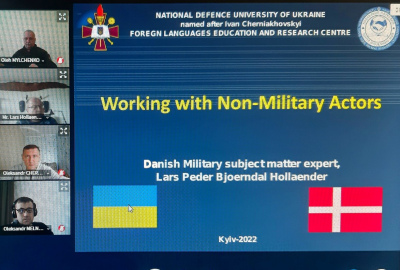L3 Joint Operations Staff Officers Training Course in English: Issues of Civil-Military Cooperation According to NATO Standards
- Головна >
- The University >
- News >
- L3 Joint Operations Staff Officers Training Course in English: Issues of Civil-Military Cooperation According to NATO Standards

From February 7 to February 9, 2022 within the framework of the “Modern Information Environment” module, the military students of L-3 Joint Operations Staff Officers Training Course of the National Defence University of Ukraine named after Ivan Cherniakhovskyi mastered the basic principles of civil-military cooperation in NATO and in the Armed Forces of Ukraine.
Colonel Oleh Mylchenko, Deputy Chief of the Foreign Languages Education and Research Centre, Maj Viktoriia Krykun (PhD in Education), Chief of the Language Testing Division, lecturer Maryna Semenkova (PhD) delivered the lectures and practical classes on “Fundamentals of the Operational Planning Process of CIMIC Activities according to NATO Standards”, “Principles of negotiation and mediation”, “Evaluation methods of Civil Environment and Procedure of the Analysis of Social and Political Situation in the Area of Operation”, “CIMIC Staff Procedures, Role and Tasks of the CIMIC Officers while the Operation Planning” in online regime using the BBB platform. A new topic on “Migration Process as a Current Security Challenge” was introduced. Military students gained theoretical knowledge on the basic principles and functions of CIMIC, procedure and specifics of the operational planning taking into account CIMIC, on NATO policy and doctrines on CIMIC.
Lars Peder Bjoerndal Hollaender, the military subject matter expert on CIMIC issues from the Kingdom of Denmark conducted classes to share his experience with military students on the methods of cooperation and organization of activities with non-governmental organizations, international organizations in the area of operation.
Training of operational staff officers on this topic allows understanding the role of the CIMIC officer during the operational planning process at all stages of the operation, the importance of the so-called “soft power” to achieve the goals of the operation, as well as effectively cooperation with representatives of international organizations, governmental and non-governmental organizations.








